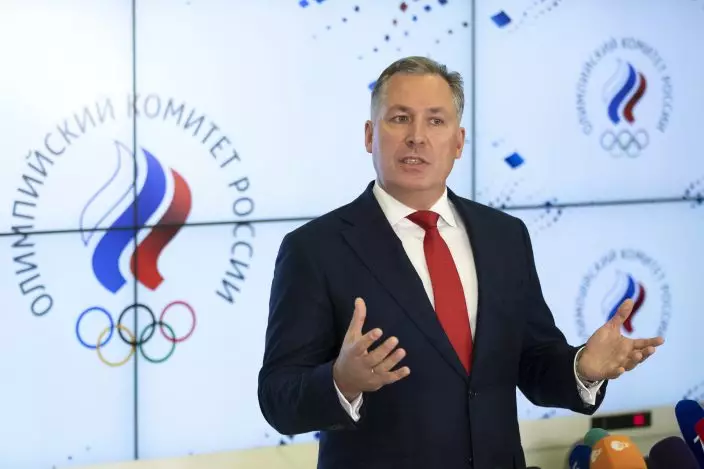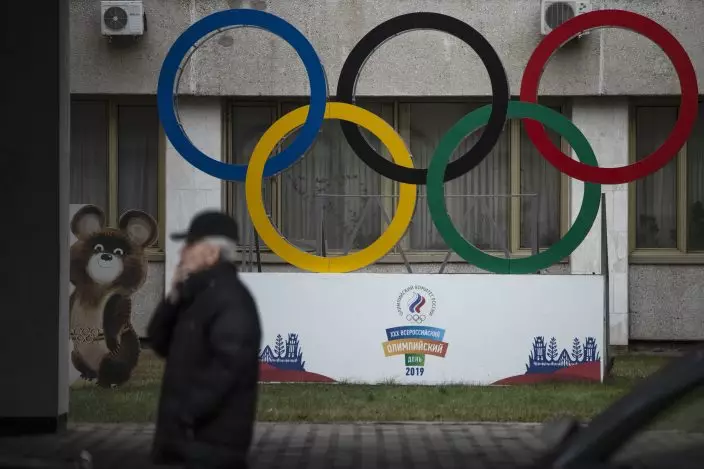Any sanctions imposed on Russia in the latest fallout of a years-long doping scandal must be observed by the IOC, the Olympic body president Thomas Bach said on Thursday.
World Anti-Doping Agency leaders have been advised to ban Russia from hosting major sports events for four years, and remove the Russian flag and anthem from those championships, when they meet on Monday in the Olympic capital city of Lausanne.
A WADA expert panel concluded Russian authorities manipulated a Moscow laboratory database — removing details of positive tests and planting fake evidence — before handing it over to investigators in January.

President of the Russian Olympic Committee Stanislav Pozdnyakov speaks during a news conference in Moscow, Russia, Thursday, Nov. 28, 2019. The WADA committee has proposed a package of sanctions including a four-year ban on hosting major events in Russia and a similar four-year sanction on Russians competing in top events like the Olympics, though they could enter as neutrals. (AP PhotoPavel Golovkin)
When the WADA panel delivered its report and recommendations last week, the IOC called the “flagrant manipulation … an insult to the sporting movement.”
Asked on Thursday if the IOC must accept the WADA executive committee’s sanction decisions, Bach confirmed: “They are mandatory.”
“IOC has in the Olympic Charter accepted the World Anti-Doping Code and if there is a decision being issued … it is mandatory,” Bach said at a news conference after chairing a three-day board meeting.

Olympic Rings and a model of Misha the Bear Cub, the mascot of the Moscow 1980 Olympic Games, left, are seen in the yard of Russian Olympic Committee building in Moscow, Russia, Thursday, Nov. 28, 2019. The WADA committee has proposed a package of sanctions including a four-year ban on hosting major events in Russia and a similar four-year sanction on Russians competing in top events like the Olympics, though they could enter as neutrals. (AP PhotoPavel Golovkin)
However, Bach refused to speculate on what WADA might decide or which sports events could be affected.
Russia’s hosting in St. Petersburg of soccer games at the 2020 European Championship and the 2021 Champions League final have been declared out of reach by WADA because European soccer body UEFA is a continental organization. World soccer body FIFA has signed up to the code but not UEFA.
A major annual meeting of Olympic stakeholders, known as SportAccord, could also be beyond the reach of WADA’s executive board.
One loophole of the WADA recommended sanctions is exemptions allowing Russia to host when “it is legally or practically impossible” to strip hosting rights.
On Saturday — after the WADA recommendations were published, and nine days before the pending sanctions decision — Lausanne-based SportAccord said the May 2021 edition of its week-long convention would be in Ekaterinburg, Russia.
The four-man SportAccord executive committee includes a close ally of Russian President Vladimir Putin, businessman Arkady Rotenberg, and former IOC member Francesco Ricci Bitti, who is an Olympic delegate to the WADA ruling panel which decides Russia’s fate on Monday.
Bach said any potential conflict of interest for Ricci Bitti would need to be addressed by WADA rules.
In the latest defense of Russian interests on Thursday, Prime Minister Dmitry Medvedev said the government ordered its sports officials “to fight for our interests” in the WADA process.
However, Yuri Ganus, the head of the Russian Anti-Doping Agency which faces being declared non-compliant on Monday, has said the expected sanctions “were to be expected, and they’re justified.”
Handing over the data from the Moscow testing laboratory's work up to 2015, when WADA published evidence confirming a state-backed doping program, was a key demand toward welcoming Russia back into the world sports community.
More AP sports: https://apnews.com/apf-sports and https://twitter.com/AP_Sports


